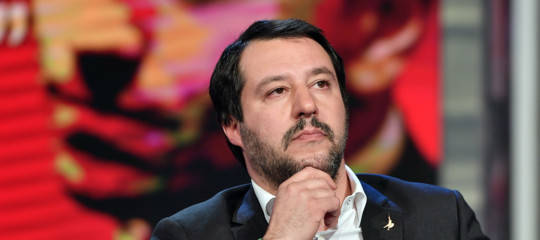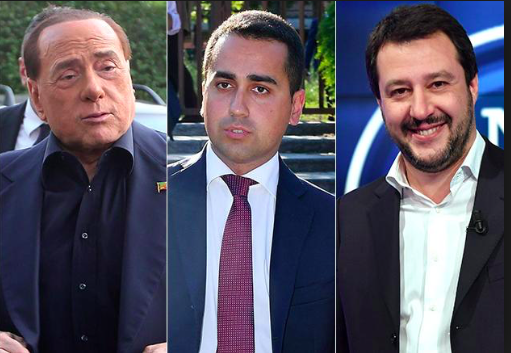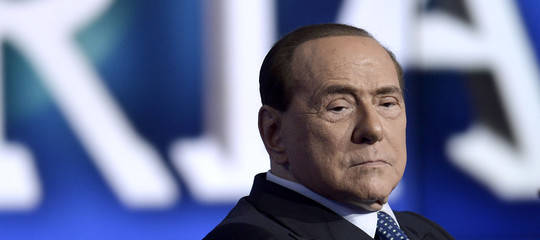Populist Government may Save Italy From Hasty new Elections
ROME -- Until lunchtime Wednesday, Italy was plunging into the year's second round of national general elections, probably slated for July, even as commentators warned that scorching July temperatures would send voters to the seashore instead to polling booths. But at one o'clock May 9 former Premier Silvio Berlusconi, staunchly allied with Matteo Salvini of the Lega, said he would drop his opposition to a proposed government of the Lega and the Movimento 5 Stelle (M5S). Together these two populist parties control just under half of the Parliament elected March 6, sufficient to marshal votes for a government.
Luigi Di Maio, who has replaced Beppe Grillo as head of the Five Stars, commands 32% of Parliament, making this the largest single political force. Lega boss Salvini is the strong man in a three-party rightist coalition, which together commands 35%. As a result, neither has been able to oust his rival. On his own Salvini has only 17%, but this boosted by Berlusconi's 14%.
Reactions are flooding in. Columnist Stefano Folli remarked on the irony that "what couldn't be done in two months was done in a couple of hours." Another authoritative columnist, Claudio Tito, suggested that, in offering his outside support, Berlusconi was also saying that if they fail, it is not his fault. Will they fail? Under their care, warns Tito, the Italian cabinet becomes an outsider in the EU political world, and Italy, a "laboratory of populism that may scare neighbors and allies." At the same time, it is not yet a done deal, and on Thursday morning a cautious Salvini warned that this turnabout is only "a first step" and that his MPs are not to make vacation reservations just yet in case elections do take place in July, according to the AGI press agency.
For nine weeks now any possibility to form a government was stalemated, with President Sergio Mattarella conducting three rounds of endless but futile all-party negotiations. A crucial reason: Berlusconi flatly refused the Five Star-Lega request he give the proposed joint government a benign but external go-ahead; to do so would "offend my dignity," he reportedly said. What made Berlusconi change his mind? First, polls show a decline in support for several parties, including Berlusconi's own Forza Italia; a new vote might worsen their relative positions. Secondly, many fear a negative public reaction because of the high cost to the country of holding new elections. Thirdly, say observers here, the parties themselves are too short of funds to be able to finance campaigns.
The alternative is for President Mattarella to appoint a caretaker government that might last through early 2019. With Berlusconi's backing down, this becomes less likely. The country needs a government able to tackle urgent problems, such as passage of the national budget, measures to govern immigration and revision of the previously untried election law, blamed for some of the present mayhem, "in order not to go back to the vote with the real danger of another inconclusive result," writes Roberto Mostarda, columnist for Wall Street International.
Back in 2011 Berlusconi, 81, was forced to resign from his third term as premier over "claims he had paid for sex with an underage sex worker" (to quote the Guardian). In 2012 Berlusconi was convicted of tax fraud and sentenced to four years imprisonment. Instead he performed four hours weekly in a home for dementia sufferers, for whom he sometimes played the piano, as he had on cruise ships as a youth. This conviction barred him from public office (albeit not from politics), but his multiple judicial trials (and a new one beginning this week) meant that the Five Stars declined to join any government in which Berlusconi would play a part.
Until this week Salvini had flatly refused to turn his back on Berlusconi, to the point that Di Maio intimated that behind their solidarity was Berlusconi financing Salvini's Lega. Now, under pressure from Mattarella, from business and financial circles and from the general public, this week the two finally agreed to form a cabinet supported only by Di Maio's 5 Stars and Salvini's Lega while formally asking Berlusconi's outside support for it. The point was to avoid Salvini's outright break with the man whom many here consider his mentor in one way or another. The compromise should avoid the costly new elections, which risk thrusting the same leaders back into the same inconclusive negotiations. Who would be premier? For the moment this remains a mystery, but in the cafes this morning there was gossip that it would be a "puppet" while Salvini and Di Maio would take over the interior and foreign ministries.
Unless it be forgotten, just before the elections Salvini called for the demise of the Euro, "a failed experiment," in his words, "the principle cause of our economic decline.... If I go into government I will have top experts keep Italians from being damaged in case the Europe crumbles." Only a few days later however, he said in a press conference in Strasburg March 12 that it would be "impossible to leave the Euro behind us just now."




































i-Italy
Facebook
Google+
This work may not be reproduced, in whole or in part, without prior written permission.
Questo lavoro non può essere riprodotto, in tutto o in parte, senza permesso scritto.